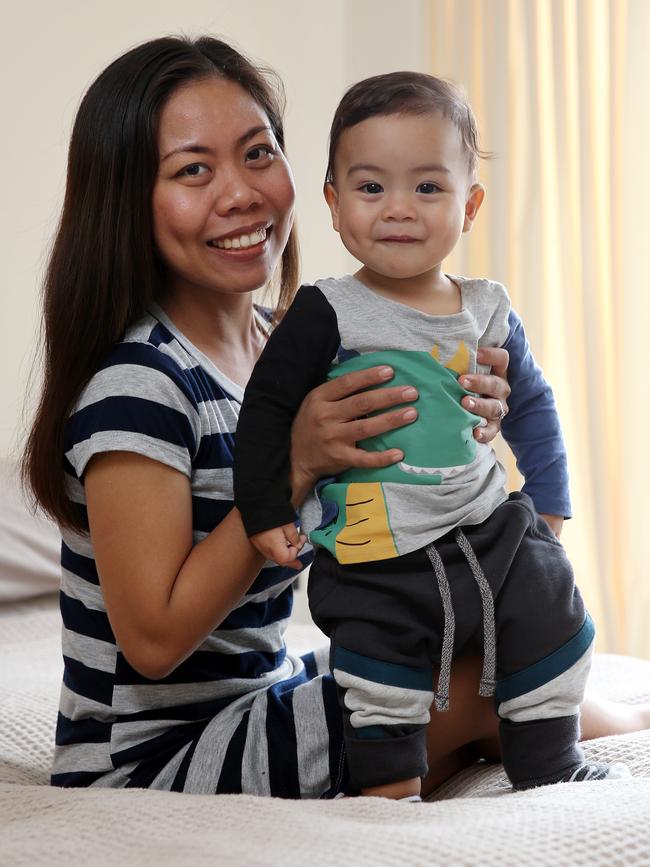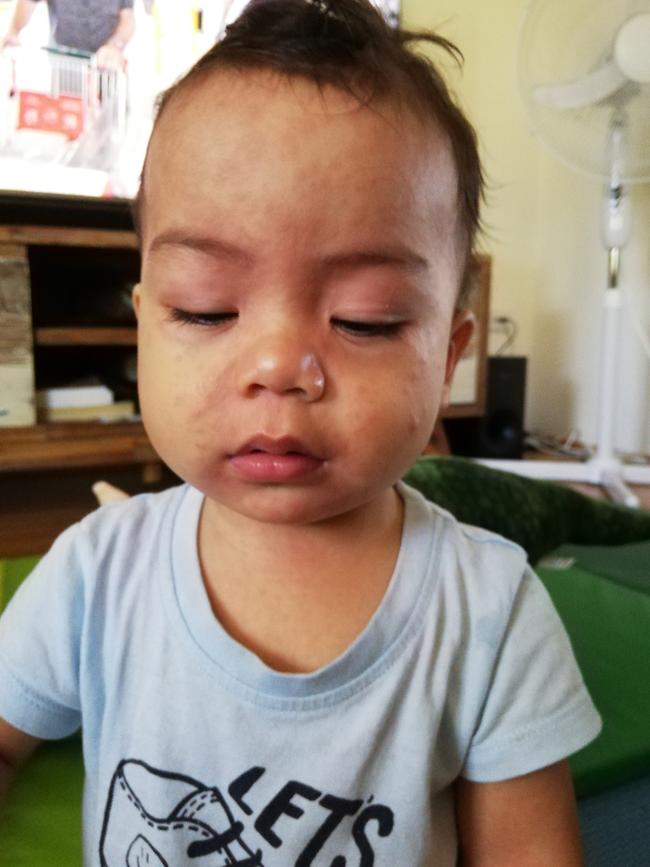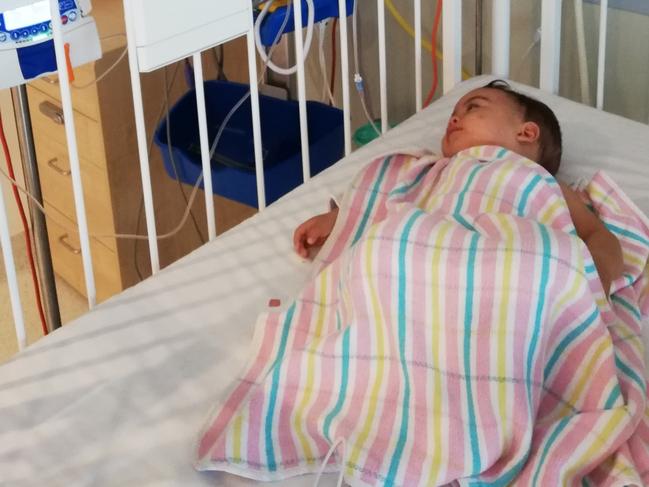Calls for bans on unimmunised tourists to stop measles breakout
With NSW in the midst of a measles outbreak, mum Cecily Johnson, whose daughter Laine died from a side effect of the disease, has called on unimmunised tourists to be banned from entering Australia. Baby Liam is one of 31 cases diagnosed since Christmas. INTERACTIVE: MEASLES HOT SPOTS
NSW
Don't miss out on the headlines from NSW. Followed categories will be added to My News.
Three people are week are being diagnosed with measles in NSW — a condition that was officially eliminated in Australia five years ago.
Most of the 31 cases diagnosed since Christmas have been tourists or locals returning from overseas holidays, while eight people, including several babies too young to be vaccinated, have acquired the virus in Australia from infected visitors or returning residents who were not vaccinated.
North coast resident Cecily Johnson, whose daughter Laine died of rare but fatal side effect — subacute sclerosing panencephalitis (SSPE) — at aged 12 after contracting measles at 10 months has called on tougher screening measures on tourists coming from overseas.

“It is outrageous, these kids are being put at risk from a preventable disease, it’s not OK,” Ms Johnson told The Sunday Telegraph.
“I think the question should be on immigration cards — are you vaccinated, because don’t come in if you aren’t immunised.”
MORE FROM JANE HANSEN:
‘THEY WANTED ME TO ABORT MY SON BUT I REFUSED’
RESEARCH MAKES YOU A VACCINATION EXPERT. NOT GOOGLE
The measles virus is so infectious that, if one person has it, up to 90 per cent of the unvaccinated people who are in contact with that person will also become infected.
Measles will kill one in 1000 who contract it, can cause encephalitis and pneumonia and can seriously harm the immune system, leaving it vulnerable to other infections.
According to the World Health Organisation measles still kills more than 100,000 people a year, mostly children under five.
The Philippines is experiencing a measles outbreak that has so far killed 315.
Most of the Australian cases have been picked up in South-East Asian countries such as the Philippines, Sri Lanka, and Thailand. Once back here, it can move frighteningly fast.
An eight-month-old infant caught the infection this week in the Haymarket area near World Square off a person who was infected.
Another, an 11-month-old infant, likely caught the infection in the Eastwood area. Both are now isolated and in treatment.
One young woman in the doctor’s surgery with the Eastwood infant also caught the airborne virus.
NSW Health Director for Communicable Diseases Dr Vicky Sheppeard said measles cases do not occur in Australia unless introduced from overseas. It has been eliminated in Australia but not eradicated.
Alarmingly, three of the cases were in children whose parents consciously chose to not vaccinate, Dr Sheppeard said.
Infected people can spread measles to others from four days before the rash appears, to four days after
“An infected person can be in a room and leave and 15 minutes later, if a susceptible person comes in, they can catch it. The virus particles get coughed out and they hang in the air,” Dr Sheppeard said.


Shendie Requillo and her husband David Eldridge thought their 11-month-old baby Liam was too young to be vaccinated and were also unaware of the Philippines outbreak when they visited the Philippines. Liam contracted measles, which did not show up until he was back in Australia.

“If we’d had known (about the measles outbreak) we would have postponed the trip and we had no idea he could have been vaccinated at nine months if we were travelling,” Ms Requillo said.
“He came out in a rash and we went to the emergency department and he was in hospital for four days, he was really, really bad, very miserable, and very weak. As parents you just don’t know what to do, there’s no treatment, it was terrifying,” the 30-year-old first time mum said.
What has averted a serious breakout so far is Australia’s high vaccination rate — near 95 per cent. The public health response has been swift to contain known cases.
But, in pockets of low immunisation, such as the Byron Shire on the state’s north coast, public health physicians like Dr Brian Pezzutti fear a serious outbreak could take hold.
“It is an enormous concern and could well be a real problem in particular in places like Mullumbimby and Byron Bay,” Dr Pezzutti said.


In 2013 an unimmunised Byron Bay high school student returned from a trip to Bali with measles. Four people were infected but the outbreak was contained.
“We had to close the school down so no one got measles. If you take your kids to Bali and they are not immunised you are running a serious risk,” Dr Pezzutti said.
Immunisation of both children and adults, who may need a booster shot, remains the best protection and the MMR vaccine is available free of charge to those adults born after 1966 who may have missed out on the two required doses of the vaccine.
Two doses of the MMR vaccine are recommended for children, with the first at 12 months and the second at 18 months of age.
NSW Health has a social media campaign aimed at travellers and young people to remind them of the risk of travelling overseas.
A spokeswoman for the federal Health Department said the government “is concerned about the spread of vaccine preventable diseases”.

“There are several large measles outbreaks across the world that are putting travellers at risk. The Department is also working with the Department of Foreign Affairs and Trade to ensure appropriate messaging on the Smartraveller website for known outbreak countries,” she said.
Professor Kristine Macartney, the Director of the National Centre for Immunisation Research, said the key thing is that anyone travelling must get immunised and if travelling with an infant, make sure their shots are up to date.
“One in 15 who get it will develop pneumonia and one in 1000 will develop severe brain swelling which can be fatal, it is a serious illness and there were multiple deaths in Europe last year, measles is a killer,” Prof Macartney said.
“Children can be well for a number of years and then they’ll develop SSPE, which is horrifying and fatal,” Prof Macartney said.
